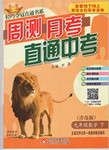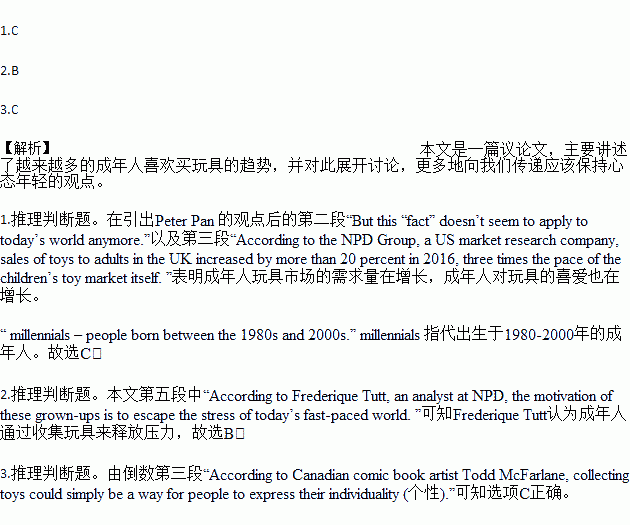题目内容
It used to be a matter of fact when Peter Pan – a character from James Matthew Barrie’s 1911 book – said: “All children, except one, grow up.”
But this “fact” doesn’t seem to apply to today’s world anymore.
According to the NPD Group, a US market research company, sales of toys to adults in the UK increased by more than 20 percent in 2016, three times the pace of the children’s toy market itself. These toys ranged from puzzles and Lego building sets to vehicle models and action figures. And more than half of the sales came from millennials – people born between the 1980s and 2000s.
“Adults of the 21st century are channeling (疏导) their inner child, one toy at a time,” commented website Koreaboo. This is also why these adults are sometimes referred to as “kidults”.
According to Frederique Tutt, an analyst at NPD, the motivation of these grown-ups is to escape the stress of today’s fast-paced world. They are driven toward the more immediate pleasures brought by toys than those brought by, say, getting a promotion, which is far less easy to achieve.
“It reminds me of the playful side of life,” Rob Willner, a 25-year-old PhD student in the UK, told The Telegraph when talking about his love for Lego, which he said brings him both comfort and entertainment.
Despite this, some social scientists see the trend as disturbing. To Frank Furendi, a professor at the University of Kent in the UK, the fact that so many adults are pursuing “the thrills (刺激) of youth” is the evidence that “adulthood has got nothing attractive about it anymore”, he told The New York Times.u “That’s actually quite sad.”
But scientists are probably just worrying too much. According to Canadian comic book artist Todd McFarlane, collecting toys could simply be a way for people to express their individuality (个性).
“It’s just pop culture stuff. It’s stuff that says, ‘I like a little of this and I like a little of that’,” he told ABC News. “[It’s] no big deal.”
So now that over 100 years have passed since Peter Pan, perhaps it’s time to introduce a new “fact”, as stated in the tagline (品牌宣传词) of the UK fashion brand KIDULT: “Growing old is mandatory (强制性的), but growing up is optional.”
1.The author mentions Peter Pan in the text mainly to ______.
A. show the influence of the character on millennials
B. explore the similarities Peter Pan and millennials share
C. lead up to the trend of millennials’ love for toys
D. analyze what has made many millennials refuse to grow up
2.Why do many adults feel like collecting toys, according to Frederique Tutt?
A. They find it brings them both comfort and inspiration.
B. They consider it a way to relieve stress.
C. They want to make up for the pleasures they missed during childhood.
D. They usually don’t get along well in their lives and need an emotional outlet.
3.What can we conclude from the article about kidults?
A. They are well-known for their pursuit of independence and freedom.
B. Social scientists feel worried about them because they take nothing seriously.
C. In Todd McFarlane’s eyes, their interest in toys is a way to express their identity.
D. They refuse to make efforts to become promoted at work as they don’t want to grow up.
 轻巧夺冠周测月考直通中考系列答案
轻巧夺冠周测月考直通中考系列答案

 running twice as fast.
running twice as fast.